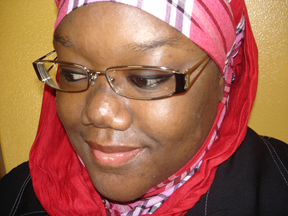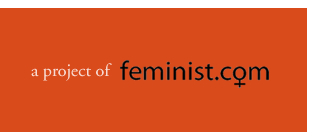Jameelah Xochitl Medina is a contributor to I Speak for Myself: American Women on Being Muslim. Her essay in the book is titled "The University of Life."
 Sexual abuse is one of those acts that is committed and that people do not want to speak about. It even happens incestuously and families keep it locked in the closet. It happens among my black community and my Muslim community. I know this because I know it happens in all communities; it happened to me. Sexual abuse is one of those acts that is committed and that people do not want to speak about. It even happens incestuously and families keep it locked in the closet. It happens among my black community and my Muslim community. I know this because I know it happens in all communities; it happened to me.
A few years ago while visiting in-laws in Morocco, I saw TV and street ads in Casablanca, Safi, and Marrakech that actually shed light on this taboo topic in a primarily Muslim country. I was highly impressed because it surpassed what I have seen in my own country of the United States. However, while at an international women’s leadership conference in Dubai a few years ago, I attended a workshop on broken homes, where physical and sexual abuse of local Emirati and foreign-born women and children was discussed. The silence in the room was disturbing, but it was heartbreaking to hear the few comments that did break the silence: comments excusing the abuse, asking what the woman must have done, and one firm “this does not happens here.”
As I sat silently, I scanned the room and wondered who else of these 120 women from over 40 countries had been sexually abused as a child. Then I wondered how many of us in the room who were of religious backgrounds had remained silent partially because we felt damned to hell due to religious beliefs about sex before marriage, and especially because unwanted sex and sexual contact before marriage had never been discussed as an exception to norms against fornication. Since that workshop and seeing those signs in Morocco warning me not to remain silent, I started thinking more about the importance of religious sex education for children that includes sexual abuse. I also made the decision not to be a silent accomplice to this reality for so many of our little brothers and sisters, nephews and nieces, and even our sons and daughters.
Speaking of daughters, my daughter was just born and I have sometimes been overwhelmed with emotions since the moment we were told we were expecting a girl. Although I am aware that boys are also victims of sexual abuse, I was secretly hoping for a boy because I was too nervous about being the overprotective, sexual abuse-survivor mother who is constantly thinking about statistics like:
- 1 in 4 girls is sexually abused before the age of 18.
- 30-40% of victims are abused by a family member.
- Another 50% are abused by someone outside of the family whom they know and trust.
- Approximately 40% are abused by older or larger children whom they know.
- The median age for reported abuse is 9 years old.
- M ore than 20% of children are sexually abused before the age of 8.
- Nearly 50% of all victims of forcible sodomy, sexual assault with an object, and forcible fondling are children under 12.
- Evidence that a child has been sexually abused is not always obvious, and many children do not report that they have been abused.
- Over 30% of victims never disclose the experience to ANYONE.
- Young victims may not recognize their victimization as sexual abuse.
Although I plan to be very vigilant as my daughter grows up, I do not plan to go crazy with it. To ensure this, I am already planning for the possibility of re-entering therapy when she reaches the age when my sexual abuse first started: four years-old. When a close great-niece reached that age, I began to have physical aches when I would look at how small she was and imagine that at that age, I was already being violated and made to do things against my will without feeling safe enough to tell anyone.
I was sexually abused by an older boy in my family from the age of four until I was ten years old. I never told anyone until I was 21 or 22, and I actually forgot about it from the time I was about 11 until I first had sex with my ex-husband at the age of 20. This is not the fate I want for my daughter. Once we knew our baby was a girl, I spent the entire afternoon excited, scared, and angry. I was excited because aside from wanting a boy so I would not worry as much, I actually did want a girl. I was scared because I was thinking about the future and things that are currently out of my control. I was angry because I realized how girls may face inequality even before they are born. I wondered just how many other parents of girls, whether they were victims of sexual abuse or not, had thought about sexual abuse, molestation, and rape after knowing that they were having a girl. I also thought about how many expecting women and men may have, even for a second, wished for a boy instead because of these issues. It angers me to think that although some girls are at risk of “termination” and infanticide even before birth in some places, in practically every corner of the earth, a girl is at greater risk of abuse just by being born.
It further disturbs me to know that religious communities are not dealing with the issues of incest, molestation, and rape during sex education and religious education about sins, specifically fornication. The message has to be loud-and-clear to our children that, if God forbid something is done to them sexually, they are not morally responsible or condemned to hell for being violated and forced to participate in sexual acts with another person. There is already enough shame, self-hatred, confusion, and anger that sexually-abused children and adults deal with without the further burden of religious trauma. There are many things that we can do; one small action is simply to broaden the way we religiously educate children about sex before marriage.
Jameelah X. Medina is a Ph.D. candidate at Claremont Graduate University. She is also an educator, author, orator, and business owner residing in southern California with her husband and daughter. www.jameelahmedina.com
Jameelah is a contributor to I Speak for Myself: American Women on Being Muslim (edited by Maria M. Ebrahimji and Zahra T. Suratwala, White Cloud Press, May 2011), a collection of 40 personal essays written by American Muslim women under the age of 40, all of whom were born and raised in the US. It is a showcase of the true diversity found in American Islam. www.ispeakformyself.com
|


 Sexual abuse is one of those acts that is committed and that people do not want to speak about. It even happens incestuously and families keep it locked in the closet. It happens among my black community and my Muslim community. I know this because I know it happens in all communities; it happened to me.
Sexual abuse is one of those acts that is committed and that people do not want to speak about. It even happens incestuously and families keep it locked in the closet. It happens among my black community and my Muslim community. I know this because I know it happens in all communities; it happened to me.